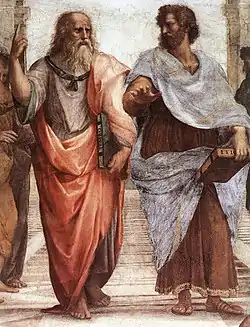History of theology
Greek theologia (θεολογία) was used with the meaning "discourse on god" around 380 BC by Plato in The Republic, Book ii, Ch. 18.[1] Aristotle divided theoretical philosophy into mathematike, physike and theologike, with the last corresponding roughly to metaphysics, which, for Aristotle, included discourse on the nature of the divine.[2]

Drawing on Greek Stoic sources, the Latin writer Varro distinguished three forms of such discourse: mythical (concerning the myths of the Greek gods), rational (philosophical analysis of the gods and of cosmology) and civil (concerning the rites and duties of public religious observance).[3]
Some Latin Christian authors, such as Tertullian and Augustine, followed Varro's threefold usage,[4] though Augustine also used the term more simply to mean 'reasoning or discussion concerning the deity'[5]
In patristic Greek Christian sources, theologia could refer narrowly to devout and inspired knowledge of, and teaching about, the essential nature of God.[6]
The Latin author Boethius, writing in the early 6th century, used theologia to denote a subdivision of philosophy as a subject of academic study, dealing with the motionless, incorporeal reality (as opposed to physica, which deals with corporeal, moving realities).[7] Boethius' definition influenced medieval Latin usage.[8]
In scholastic Latin sources, the term came to denote the rational study of the doctrines of the Christian religion, or (more precisely) the academic discipline which investigated the coherence and implications of the language and claims of the Bible and of the theological tradition (the latter often as represented in Peter Lombard's Sentences, a book of extracts from the Church Fathers).[9]
In the Renaissance, especially with Florentine Platonist apologists of Dante's poetics, the distinction between "poetic theology" (theologia poetica) and "revealed" or Biblical theology serves as steppingstone for a revival of philosophy as independent of theological authority.
It is in this last sense, theology as an academic discipline involving rational study of Christian teaching, that the term passed into English in the fourteenth century,[10] although it could also be used in the narrower sense found in Boethius and the Greek patristic authors, to mean rational study of the essential nature of God – a discourse now sometimes called theology proper.[11]
From the 17th century onwards, it also became possible to use the term theology to refer to study of religious ideas and teachings that are not specifically Christian (e.g., in the term natural theology which denoted theology based on reasoning from natural facts independent of specifically Christian revelation[12]) or that are specific to another religion.
"Theology" can also now be used in a derived sense to mean "a system of theoretical principles; an (impractical or rigid) ideology".[13]
See also
References
- Liddell and Scott's Greek-English Lexicon
- Aristotle, Metaphysics, Book Epsilon. Archived 16 February 2008 at the Wayback Machine
- As cited by Augustine, City of God, Book 6, ch.5.
- See Augustine, City of God, Book 6, ch.5. and Tertullian, Ad Nationes, Book 2, ch.1.
- City of God Book VIII. i. "de divinitate rationem sive sermonem" Archived 4 April 2008 at the Wayback Machine
- Gregory of Nazianzus uses the word in this sense in his fourth-century Theological Orations Archived 2006-08-07 at the Wayback Machine; after his death, he was called "the Theologian" at the Council of Chalcedon and thereafter in Eastern Orthodoxy—either because his Orationswere seen as crucial examples of this kind of theology, or in the sense that he was (like the author of the Book of Revelation) seen as one who was an inspired preacher of the words of God. (It is unlikely to mean, as claimed in the Nicene and Post-Nicene Fathers Archived 2006-07-16 at the Wayback Machine introduction to his Theological Orations, that he was a defender of the divinity of Christ the Word.) See John McGukin, Saint Gregory of Nazianzus: An Intellectual Biography (Crestwood, NY: St. Vladimir's Seminary Press, 2001), p.278.
- "Boethius, On the Holy Trinity" (PDF). Retrieved 2012-11-11.
- G.R. Evans, Old Arts and New Theology: The Beginnings of Theology as an Academic Discipline (Oxford: Clarendon Press, 1980), 31–32.
- See the title of Peter Abelard's Theologia Christiana, and, perhaps most famously, of Thomas Aquinas' Summa Theologica
- See the 'note' in the Oxford English Dictionary entry for 'theology'.
- See, for example, Charles Hodge, Systematic Theology, vol. 1, part 1 (1871).
- Oxford English Dictionary, sense 1
- Oxford English Dictionary, 1989 edition, 'Theology' sense 1(d), and 'Theological' sense A.3; the earliest reference given is from the 1959 Times Literary Supplement 5 June 329/4: "The 'theological' approach to Soviet Marxism ... proves in the long run unsatisfactory."
External links
| Library resources about History of theology |
| Look up theology in Wiktionary, the free dictionary. |
| Wikiversity has learning resources about School:Theology |
| Wikiquote has quotations related to: theology |
- "Theology" on Encyclopædia Britannica
- Chattopadhyay, Subhasis. "Reflections on Hindu Theology" in Prabuddha Bharata or Awakened India 120(12):664-672 (2014). ISSN 0032-6178. Edited by Swami Narasimhananda.
 Theology public domain audiobook at LibriVox
Theology public domain audiobook at LibriVox